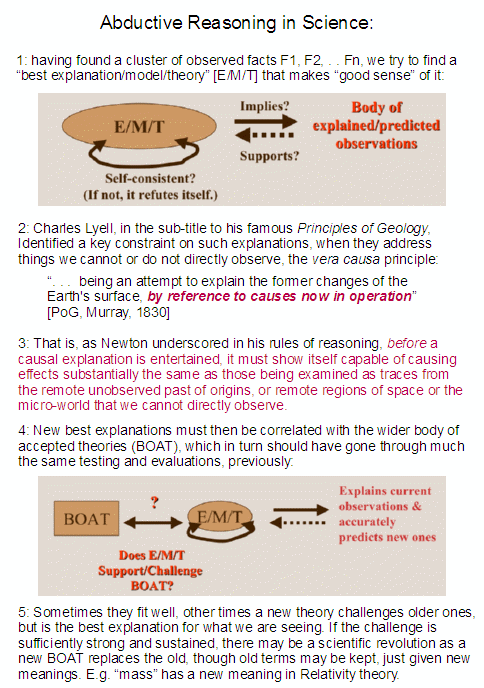It is highly relevant and timely to now ponder “Big-S Science and appeals to official consensus i/l/o the logic of the pessimistic induction and what warrant entails,” with “degrees of warrant, open mindedness and tolerance/diversity.”
It is probably best to start with the pessimistic induction, here, via SEP:
If one considers the history of scientific theories in any given discipline, what one typically finds is a regular turnover of older theories in favor of newer ones, as scientific knowledge develops. From the point of view of the present, most past theories must be considered false; indeed, this will be true from the point of view of most times. Therefore, by enumerative induction (that is, generalizing from these cases), surely theories at any given time will ultimately be replaced and regarded as false from some future perspective. Thus, current theories are also false . . . [Scientific Realism, SEP]
While I don’t buy the “surely,” we need to soberly ponder what a scientific theory is and what degree of warrant attaches to such. In commenting on the Cells thread, I noted:
Theories are constructed explanatory narratives that may be tested and supported or falsified by observations [subject to Lakatos’ issues on auxiliary theories etc] but are not themselves facts of observation, they simply are not in the same category. Yes, the span of tested empirical reliability of a theory may well be a further fact of observation, but that is not the theory itself and is subject to the next observation. Besides, as one who worked with engineering models, e.g. of electronic circuits, I know that many models are deliberately false simplifications that can be highly reliable for similar gamuts of testing. A theory, one suspects, may be definable as a potentially true model of the world or of a relevant aspect. Though, the pessimistic induction haunts all such suggestions.
Now, while there is often a suggestion that there is material continuity between past, once successful theories and their current successors — call this the germ of truth thesis — in fact there may be a lot more replacement than is recognised or acknowledged . . . call that the myth of progress rebuttal. Further, the underlying issue lies in the logic of abductive reasoning underlying scientific theorising:

Notice, the implication direction, from theory to current observations [O = {o1,o2, . . . on}] and predicted facts of observation [P = {p1, p2, . . . pm, . . . }]:
T => O AND P
While O is at a given point a closed set, P is open to the future. Lakatos’ adjustment, of course is that T is also composite, involving a protected core and a belt of auxiliary hypotheses so that often the auxiliaries can be treated as sacrificial, protective armour belts that soak up the damage. So, it is hard to directly empirically refute a core theory. Objecting colleagues to Galileo could readily argue that the imperfections of his telescopes rendered his claims suspect. Reportedly, some refused to look through same.
The underlying issue, however, is a logical one, T => O + P, O+P so T, strictly speaking affirms the consequent. Even, ignoring the open-endedness of P. What instead we are doing is arguing by way of reliable empirical support for T as best current explanation. Across time, Candidates will change and the best current explanation may be a refinement or a replacement.
That is, empirical warrant in science is provisional, defeat-able. We hope, that there is a possibility of truth, but cannot show it to certainty. Where, empirical reliability is an observable and we can be confident of that, on an assumption of stability.
Science, in short, is never settled and progresses by the breaking of former consensus. The tendency of officialdom to appeal to settled Big-S Science and/or consensus as gold standard of knowledge, though understandable sometimes, is misdirected.
Again, it is time for fresh thinking. END